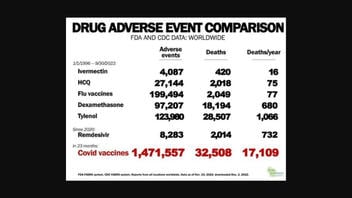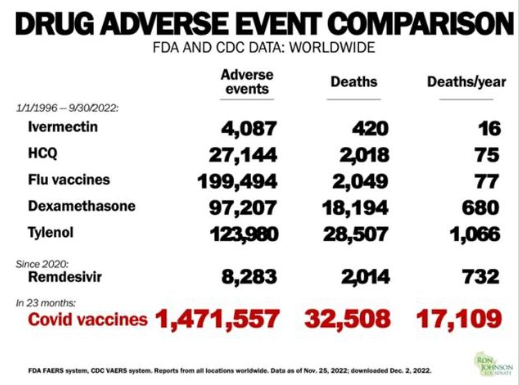
Does data pulled from the Adverse Event Reporting System and the Vaccine Adverse Event Reporting System prove that COVID-19 vaccines have caused more than 1.4 million adverse events and over 32,000 deaths as of November 25, 2022? No, that's not true: The Vaccine Adverse Event Reporting System, known as VAERS, is a government database of negative health reactions to vaccines as reported by the general public that does not provide proof of causation. Similarly, the Adverse Event Reporting System or FAERS, a database run by the Food and Drug Administration, does not prove causation between a product and a health event. Neither database is meant to determine if a vaccine causes a health problem. In addition, health officials do not list adverse vaccine reactions as an official cause of death.
The claim originated in a post shared on Instagram on November 16, 2023, (archived here) that used data attributed to the Food and Drug Administration and the Centers for Disease Control and Prevention (CDC) to imply that COVID vaccines are dangerous. This is how the post appeared at the time of writing:
(Source: Instagram screenshot taken Fri Nov 17 01:42:00 UTC 2023)
As of November 17, 2023, there were five COVID vaccines approved by the Food and Drug Administration (FDA) for use in the United States.
Neither FAERS nor VAERS is designed to determine if any of these or other vaccines caused a health problem. Both are self-reported databases -- meaning anyone can report a supposed event and such accounts are not independently reviewed and confirmed by medical professionals. As a result, VAERS and FAERS reports cannot prove that a vaccine caused any health problem.
VAERS is a tracking mechanism and does not prove causation
VAERS serves as an "early warning system," co-managed by the Centers for Disease Control (CDC) and FDA, to monitor the safety of vaccines after they are authorized for use in the U.S. The database's website warns that VAERS data also has limitations: The Guide to Interpreting VAERS Data states that anyone can submit VAERS reports and cautions that the reports often lack details and sometimes contain factual errors.
A report to VAERS generally does not prove that the identified vaccine(s) caused the adverse event described. It only confirms that the reported event occurred sometime after [the] vaccine was given. No proof that the event was caused by the vaccine is required in order for VAERS to accept the report. VAERS accepts all reports without judging whether the event was caused by the vaccine.
A spokesperson for the CDC previously told Lead Stories that U.S. health officials do not categorize adverse vaccine reactions as an official cause of death. The vaccination status and records of deceased individuals are also not tracked.
FAERS is a surveillance program, not a collection of corroborated reports
FAERS is a tool used by the FDA to monitor potential safety concerns related to a marketed product and to evaluate a manufacturer's compliance with reporting requirements. Anyone can voluntarily submit reports to FAERS using the MedWatch website. As with VAERS, experts do not corroborate the submitted information and do not determine whether a product caused a health event.
The FDA warns that FAERS, too, has its limitations. In its Q&A on the Adverse Reporting System, it cautions that:
... there is no certainty that the reported event (adverse event or medication error) was due to the product. FDA does not require that a causal relationship between a product and event be proven, and reports do not always contain enough detail to properly evaluate an event.
A range of variables related to a reported event also must be considered, the Q&A adds. It concludes:
Therefore, FAERS data cannot be used to calculate the incidence of an adverse event or medication error in the U.S. population.
Safety of COVID vaccines
Medical experts generally agree that the benefits of COVID immunization outweigh the potential risks; severe reactions after immunization are rare. The CDC writes that multiple factors contribute to reports of death after immunization, including heightened public awareness and reporting requirements for health care providers and vaccine providers. The CDC has also publicly posted all scientific publications examining COVID adverse events on its website.
Other Lead Stories debunks of claims about COVID vaccines and deaths can be read here.


















